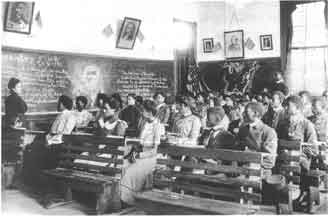1881 Tuskegee Institute Founded

In 1881, Booker T. Washington opened the Tuskegee Institute. The Institute became the leading Black agricultural and industrial school. Washington became the leading Black proponent for Black self-sufficiency.
In the annals of American history, few institutions have been as influential in the sphere of African American education and empowerment as the Tuskegee Institute. Situated in Tuskegee, Alabama, this historically black university stands as a testament to the resilience, determination, and vision of generations of African Americans who sought to carve out a space for learning and progress in a nation marred by racial prejudice.
The seeds of Tuskegee Institute were sown on July 4, 1881, when the Alabama State Legislature, recognizing the need for a "colored" educational institution, set forth funds for its establishment. The inception of the institute was a collaborative effort between Lewis Adams, a former slave with a vision for the future, and George W. Campbell, a former slave owner. Together, they raised funds to purchase a 100-acre plot in Macon County, Alabama, which would serve as the cornerstone for this educational edifice. The reins of this nascent institution were handed to a young, dynamic 25-year-old, Booker T. Washington, who was appointed its first principal and teacher.
Under Washington's leadership, the Tuskegee Institute blossomed, emphasizing the principles of self-reliance and hands-on training. Washington believed in equipping students with practical skills that would ensure their economic independence. This ethos saw the institution grow exponentially, and by the dawn of the 20th century, it had firmly established itself as one of the premier African American educational hubs in the nation.
The institute's prominence was further bolstered by its galaxy of renowned educators and scientists. One such luminary was George Washington Carver, the institution's director of agricultural research. Carver's groundbreaking work, especially his innovative research with peanuts, not only elevated the status of the institute but also played a pivotal role in transforming the agricultural and economic landscape of the region.
However, Tuskegee's journey was not without its challenges and controversies. In 1895, Booker T. Washington delivered what came to be known as the "Atlanta Compromise" speech, where he advocated for vocational training as a path to economic self-sufficiency for African Americans. While this pragmatic approach garnered appreciation from several white philanthropists and leaders, it also drew the ire of many black leaders who believed Washington was being too conciliatory.
Tuskegee's legacy was further burnished during the tumultuous years of World War II. The institution was catapulted to national fame due to its Civilian Pilot Training Program, producing the valiant Tuskegee Airmen. These brave African American pilots not only played a crucial role in the war effort but also shattered racial prejudices, paving the way for the desegregation of the U.S. military.
In the ensuing years, Tuskegee continued its upward trajectory, diversifying its academic offerings and producing stalwarts in various fields. Its contribution to American society was recognized in 1965 when it was designated a National Historic Landmark.
